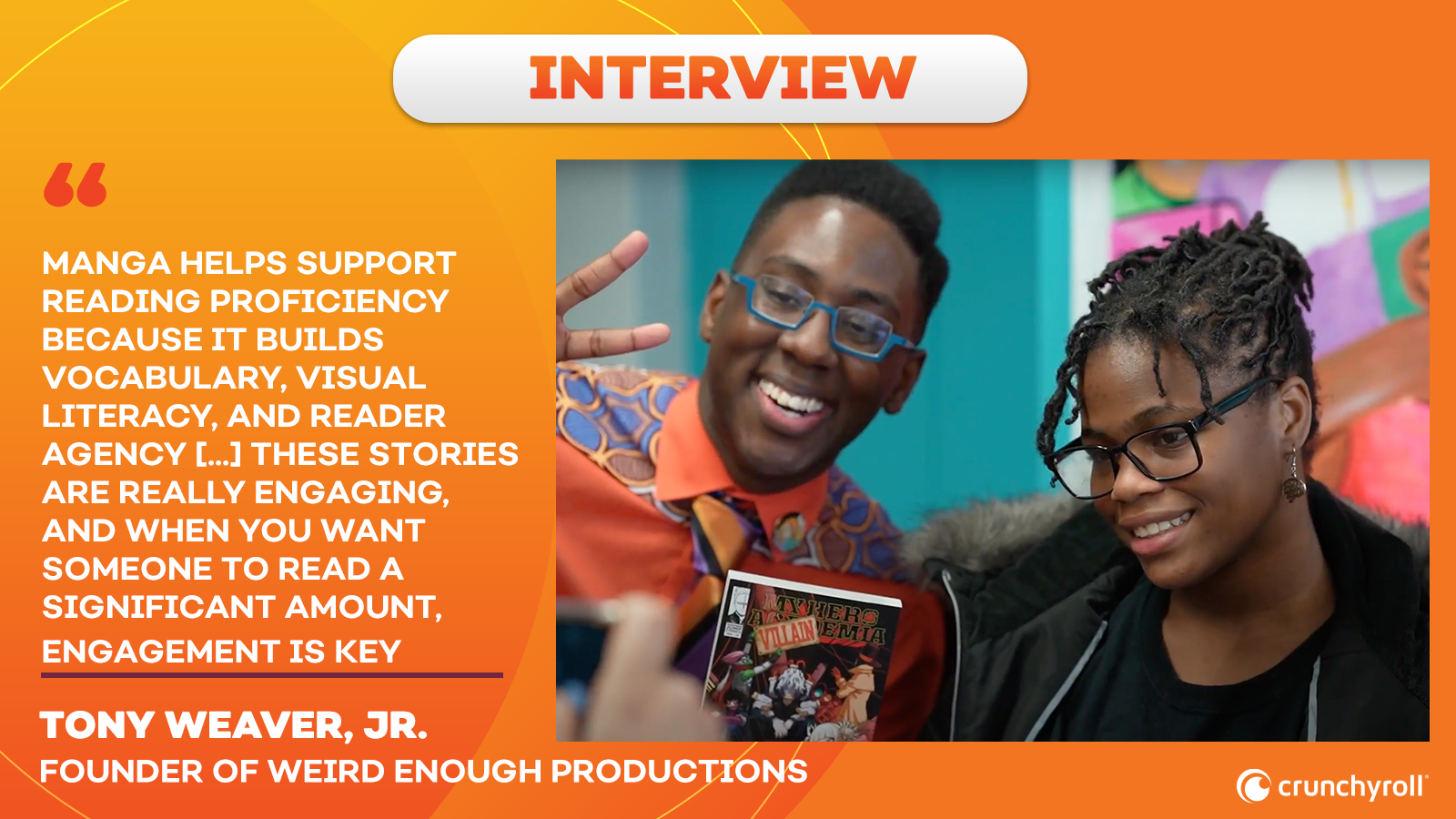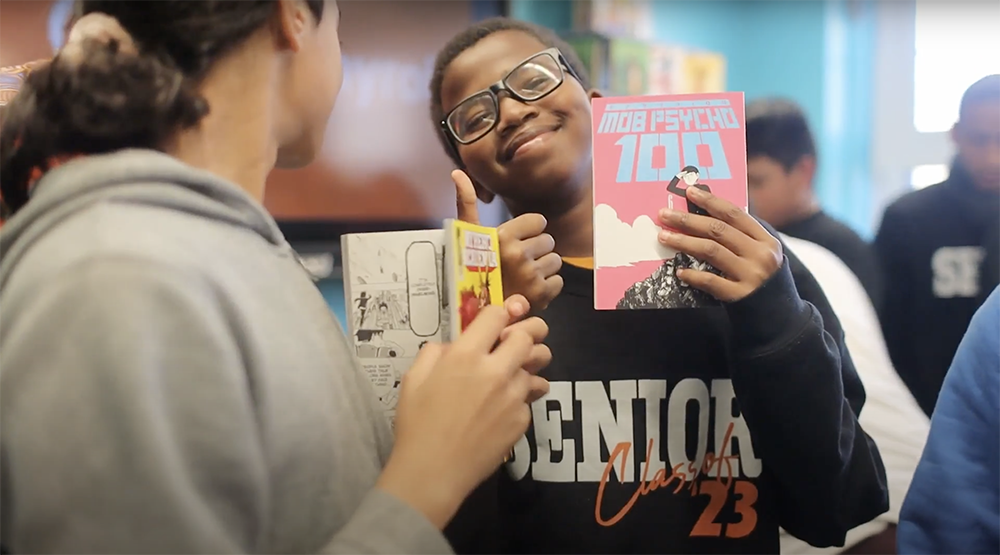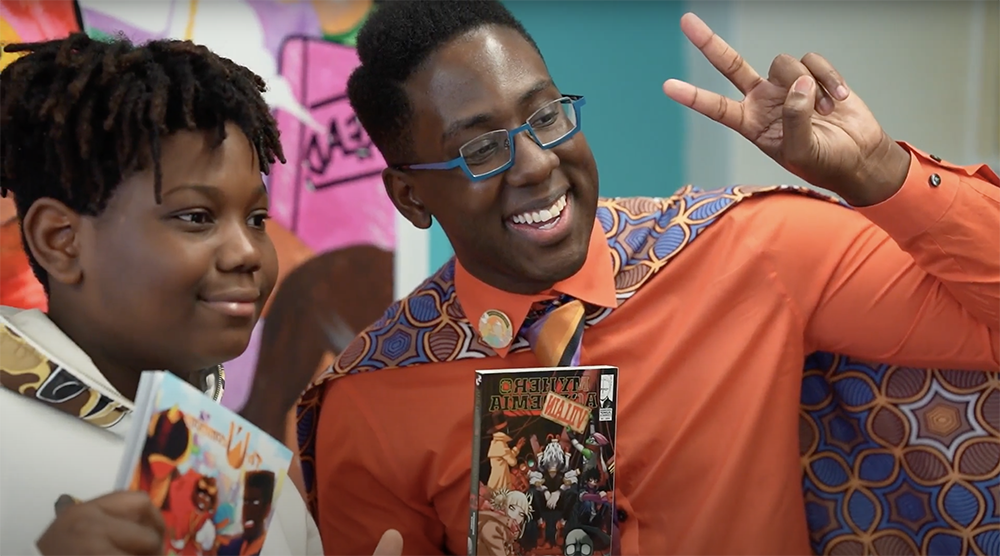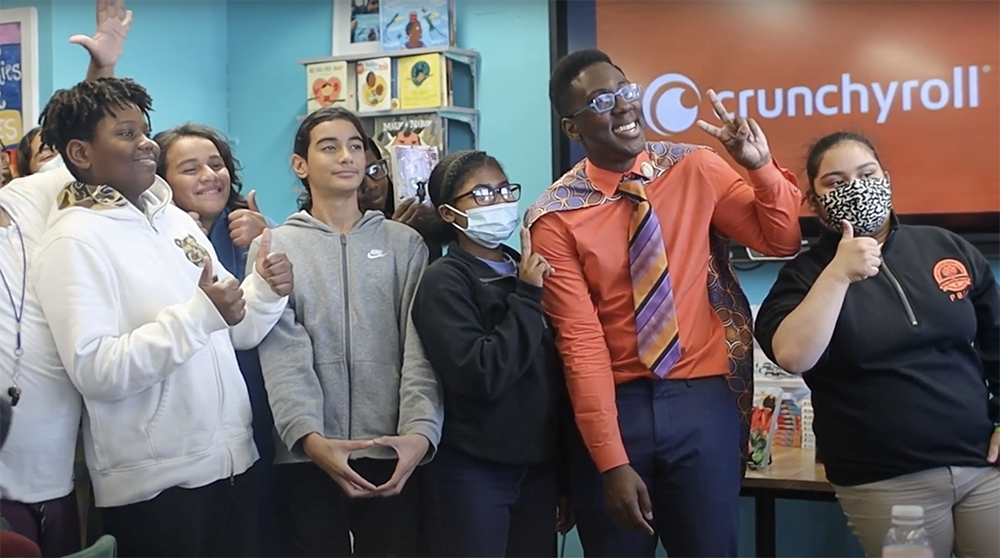INTERVIEW: Weird Enough's Tony Weaver on The Life-Changing Power of Manga

Last November, concurrent with Anime NYC, Crunchyroll partnered with the media company Weird Enough Productions to host a community event at P.S./M.S. 5 Port Morris, a K-8 School in The Bronx with a focus on literacy. In that community, 70% of students read below grade level, so the school is deeply committed to providing reading tools for students. A lot of these students don’t have a local library, so the school is playing a major role in making sure they have access to books.
The event was hosted by Weird Enough’s Tony Weaver Jr., where the author met with middle school students and gave them a positive, motivational talk about self love and being yourself. At the end of the event, Tony and Tim presented the students with a donation of over 200 volumes of manga to the school!
Last year we published an interview with Weaver, and today, we're proud to share a new interview with the creator where he updates us on his series The Uncommons, his company, and the ways that manga can help young people. Along with the interview, we've shared photographs taken at the community event described above.
Crunchyroll: Hi Tony! It’s nice to talk with you again. For any of our readers who didn’t catch our first interview with you, could you introduce yourself and what you do?
Tony Weaver, Jr.: My name is Tony Weaver, Jr. and I wear a lot of hats. I’m the mangaka for a series called The UnCommons. I’m a voice actor in anime and video games. I’m the founder of a diverse media company called Weird Enough Productions. And I also can be found on TikTok spreading the holy word of anime to about 600 thousand people. I wear a Mt. Lady hat for that last bit. Like I said. Lots of hats.
We talked a bit about it last time, but could you tell us a bit about your organization Weird Enough and the advocacy and outreach it does within schools and libraries?
Weaver: Weird enough is a social impact organization using the power of stories to help young people believe in themselves. We produce an original Manga called the UnCommons that has almost 3 Million readers. And we run national literacy programs that partner with schools, libraries, and community centers to put reading materials into the hands of kids that need them most. We create amazing stories on the page, and do meaningful community work to keep the impact going.

Have you noticed any discrepancies or connections between the availability of manga vs more traditional fiction and non-fiction books at libraries?
Weaver: Graphic novels in general are in a really precarious place right now. On one hand, we have more graphic novels being sold in The US than ever before, with many literacy specialists using them as a key literacy tool. On the other hand, you have officials at the county and state level trying to ban graphic novels. In one case, literally one parent got 3,000 graphic novels taken off the shelf. The financial barriers for school districts are still there, but there's also this weird cultural barrier that may be even harder to overcome.
What role can manga play in increasing reading proficiency? Do you feel manga is an easier entry point for young readers?
Weaver: Manga helps support reading proficiency because it builds vocabulary, visual literacy, and reader agency. Graphic novels have been found to use more uncommon words than their prose counterparts. If you think about all the unique words used for manga power systems and attacks it shouldn’t be surprising. I mean, where else would a 14 year old learn stuff like "Spiritual Pressure or Eight Triagrams 64 Palms." In Black Clover there's a move called “Dark Cloaked Dimension Slash: Equinox.” That's at least three SAT words.
The visual nature of the art lets students combine words with context, which goes a long way for their general comprehension skills. Frankly, I think it's an easier entry point for young readers because students have a much wider variety of stories to pick from. These stories are really engaging, and when you want someone to read a significant amount, engagement is key.
Have you noticed any interesting data or trends with young readers as manga has become more and more accessible and accepted into the mainstream?
Weaver: The most wholesome thing I’ve noticed is that young readers are extremely welcoming. If you think about it, anime has been mainstream for at least a decade at this point, but the young readers that are driving its popularity right now don’t seem to be focused on elitism or pointing fingers about who a “real” anime fan is. They’re just really happy they get to enjoy the content. That's the sort of attitude I like to encourage.

In your opinion, what is it about manga that connects so deeply to readers in general, and young, marginalized readers more specifically?
Weaver: I think the serialized nature of manga makes it easier for us to relate to characters because we see them develop over time. A [little while ago] Ash finally won the Pokémon championship and so many people were excited because it felt like we’ve been on that journey with him. I think young manga readers, especially ones from marginalized backgrounds, can relate to the experiences of feeling out of place or being othered that a lot of anime characters go through. And that, in many ways, getting to see these characters overcome challenges and emerge victorious gives them hope. I know it did for me.
If someone wanted to help support students, schools, and libraries in their area but didn’t know how, what would you advise them to do?
Weaver: Speak to the educators in your community to understand the need, and act accordingly. Sometimes they need resources, sometimes they need volunteers, sometimes they just need advocates.
You can have a major impact locally just by showing up.
How can people support Weird Enough and your cause?
Weaver: It sounds cliche to say, but following me goes a long way. Supporting me across social media platforms opens a lot of doors for us to continue our work. The UnCommons just relaunched as a WEBTOON Original, and I’d really appreciate you giving it a read.
Do you have anything else you would like to say to fans of your work or anime fans in general before we close?
Weaver: Anime is for everyone! We individually have a responsibility to keep our community open and kind. A little goes a long way!

By Crunchyroll feed

Post a Comment